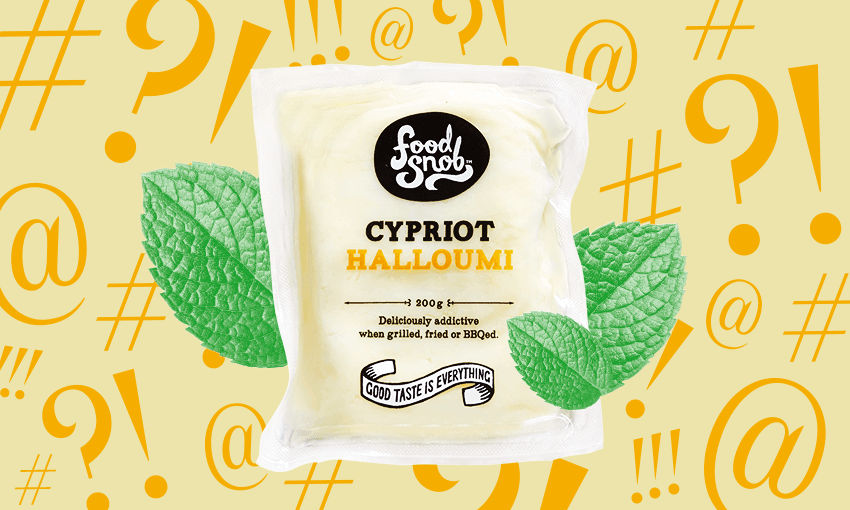A devotee of the squeaky cheese investigates why his favourite brand has started speckling its halloumi with a dried herb.
Halloumi is one of the purest joys in this world. It takes one of the best foods, cheese, and makes it just that little bit better by paradoxically allowing it to be cooked without melting. It’s something I’ve never really understood, but will happily consume it without question. There’s just a je ne sais quoi about that hot, squeaky, rubbery cheese that makes me and many others really happy.
In my honestly held opinion, the best easily accessible local halloumi is made by Food Snob. It’s about $9 a block, which puts it toward the upper end of your garden variety supermarket halloumi, but to me it’s worth the extra outlay. It holds its form better, it crisps better and, most importantly, it tastes better. I’m clearly not alone in this thinking given the Food Snob halloumi is the halloumi of choice for many eateries and delivery services like My Food Bag.
But at some point in the last couple of months I was left in a state of confusion as I prepared to slice open a fresh packet of Food Snob halloumi. When I looked at the swollen cheesy block, I noticed it was covered in little green speckles that, on first glance, looked inedible and dare I say it… a bit like mould. To my relief, it wasn’t, and my partner’s expert taste buds deduced it was in fact mint.
This only left me with new questions: why tamper with something that’s already perfect? And why would said tampering involve the addition of mint?
As it turns out, that’s because without the mint this cheese wouldn’t be authentic halloumi – at least according to Food Snob.
“Food Snob halloumi is imported from Cyprus,” a spokesperson for the brand explained. “You have noticed the little green bits… this is dried mint. Due to the recent changes to the EU agreement, mint addition to our halloumi is to align with PDO mandates from the origin country Cyprus.”
But what does that mean? PDO is a European Union term standing for “protected designation of origin” and refers to the links to the geographical place in which a product is made. Think of how champagne can’t really be called champagne unless it comes from the French region of Champagne. That’s because champagne the drink has been granted PDO status.
Other food products to be protected include single Gloucester cheese, types of French ham and even feta – though this one only applies within the European Union at this stage.
In New Zealand, you’ll notice that a lot of so-called “halloumi” is actually labelled “haloumi” – with just one L – often signifying that while it is halloumi-style, it has not been made in Cyprus.
Cyprus-made halloumi was first granted this protection in 2021, sparking some concern from cheesemakers here. “This erodes the heritage and evolution of food production in places like New Zealand where cheeses such as feta, gruyère, havarti and halloumi are commonly consumed and considered generic,” Neil Willman, president of the Specialist Cheesemakers Association, told Stuff at the time.
But for Cyprus, it was a big occasion. Cypriot president Nicos Anastasiades said in a tweet that it was a “milestone day” for halloumi and his country.
We’re well past the name debate now, but where does the mint come into all of this? Earlier this year, the PDO rules were amended. Some requested changes were shut down, like the ability to make lactose-free halloumi (I have always wondered why this doesn’t exist). “The cheese must be made from milk, pasteurised or not, in order to be considered as a PDO halloumi,” said the Cypriot Ministry of Agriculture.
But other additions were allowed, and that included mint. The European Union’s amendment to the PDO states that the “specific characteristics” of the cheese must include a “characteristic smell and taste”, and more precisely, that it must have an “aroma and taste of mint” along with a “barnyard smell and a pungent, salty taste”.
Here’s what Food Snob told me about it: “This addition is a traditional Cypriot technique which includes patting down the cheese with dried mint and this nods to the original preservation technique of wrapping the cheese in mint leaves,” the spokesperson said.
“This technique results in small flecks of mint speckled through the cheese which enhances the delicious flavour profile of the authentic halloumi.”
When asked whether all imported halloumi would soon have mint, the spokesperson said: “If it is authentic then yes.” Food Snob has also added a PDO icon to its packaging to highlight this.
In short, it’s only “authentic” halloumi if it’s from Cyprus – and includes mint. Otherwise, it’s just sparkling cheese.





